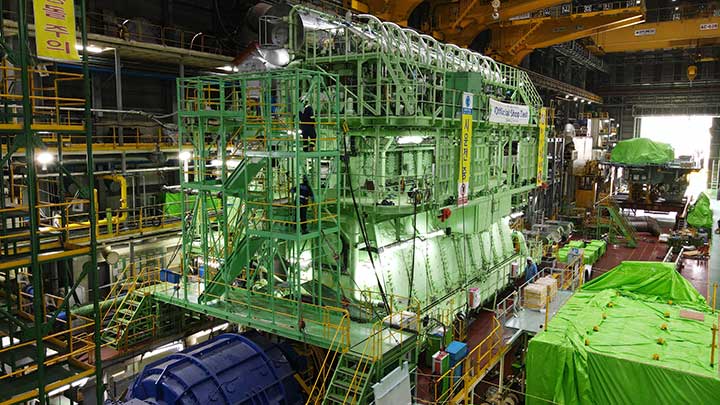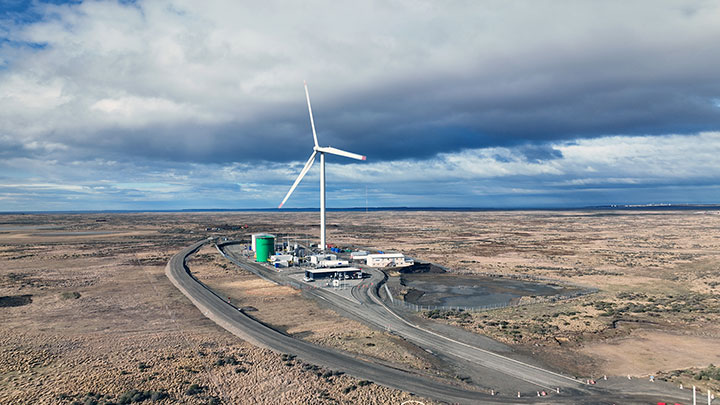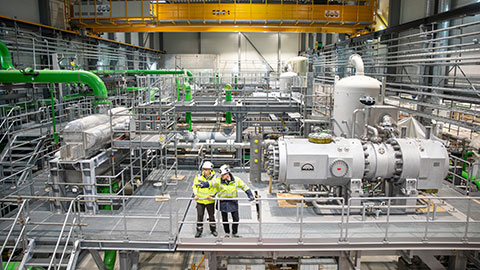MAN Energy Solutions: Pioneering Decarbonization
At MAN Energy Solutions, we pioneer solutions for the world’s largest industries, engineering change for the better. For more than 250 years, we have brought about some of the most impactful innovations in advanced engineering and complex systems always considering a challenge within the larger context and searching for solutions that advance sustainable progress for all.
This experience has prepared us well for what is, without a doubt, our biggest challenge yet: Together with our customers, we are determined to make the fight against climate change the future of our business growth. Catering to sectors that are essential to the world economy, we offer systems to bring down emissions that are considered hard to abate.
We are radically rethinking the status quo and our own product portfolio, dedicating ourselves to being pioneers of decarbonization in shipping, energy and industrial production. From future-facing key technologies to industry-leading digital solutions and a continuously developing core portfolio – we have the experience, the technology and the passion to get this job done.
We have the opportunity to decarbonize industries that are crucial for the world economy. That’s why we get out of bed every morning.
Our decarbonization mission in figures
Together with our customers, we are determined to make the fight against climate change the future of our business growth. To achieve net zero emissions by 2050, we must reduce emissions by two thirds in this decade.
Frequently asked questions
What is decarbonization?
Why is decarbonization important?
As decarbonization is directly linked to climate change, it helps to reduce the temperature rise and other casualties related to the emission of greenhouse gases. By integrating decarbonization into your workflows, you contribute to lowering emissions, and work more sustainably.
What are decarbonization benefits?
Benefits of decarbonization are:
- Reduction of greenhouse gases
- Improving energy efficiency
- Reliance on renewable energies that won’t vanish in the future
- Enhancement of your reputation and brand image
How does decarbonization work?
Decarbonization works differently depending on the decarbonization strategy and the circumstances. Some industries work best with alternative fuels in engines, like methanol or ammonia. Others use solar panels or wind energy directly. Generally speaking, you substitute fossil fuel with renewable energy. Most of the time, that’s done step by step, continuously reducing the emissions of greenhouse gases until you don’t produce any.
What is decarbonization technology?
Examples of decarbonization technology are direct electrification, green hydrogen, Power-to-X and heat pumps.
Green Hydrogen, for example, is crucial for decarbonization. It has the possibility of becoming the main future fuel for ships or power plants.

Decarbonization in the industry
MAN Energy Solutions offers dedicated technologies for the different industries.
Decarbonization in shipping can be achieved through the use of synthetic fuels generated from renewable energy sources.
For decarbonization in the energy sector, Power-to-X is a common example, as well as low-emission engine technologies such as combined heat and power plants.
Decarbonization in the industrial sector is especially connected to carbon capture and storage (CCS). MAN Energy Solutions provides technologies for small- and large-scale industrial plants to reduce emissions
Articles about decarbonization with MAN Energy Solutions
Learn more about how MAN Energy Solutions pursues decarbonization.
-

Methanol fueled ships
Sustainable shipping starts now. Find out more about the first large-scale engines for container ships run on green methanol.
-

Haru Oni e-fuels
The Haru Oni demonstration plant could pave the way for a viable alternative to fossil fuels: It produces synthetic e-fuels from hydrogen that can help the fight against climate change. MAN Energy Solutions provided the e-methanol reactor to the plant.
-

Esbjerg Heat Pump
How a seaport town in Denmark is decarbonizing district heating with seawater and large-scale industrial heat pumps.
Our innovative portfolio for your decarbonization
Our portfolio helps customers reduce emissions, use energy more efficiently, and leverage green fuel alternatives. With a wide range of key future technologies, industry-leading digitalization services, and a broad portfolio of products made to last, we are well-equipped to provide sustainable answers to today’s climate challenges.
Read about our latest developements
Decarbonization is a multifaceted topic. Learn more about the newest decarbonization processes and strategies, and how MAN Energy Solutions is contributing to a green, carbon-neutral future.
World’s Largest Methanol Engine Marks “Unbelievable Achievement”
At a ceremony in South Korea on March 22nd, HHI-EMD celebrated the world’s largest methanol-powered two-stroke engine, an MAN B&W G95ME-LGIM type. Simultaneously, the engine’s manufacture pushed the company past the 200 million brake-horsepower milestone for low-speed, two-stroke engines.
Bjarne Foldager, Head of Two-Stroke Business, attended the ceremony on behalf of MAN Energy Solutions. In a speech at the event, he congratulated Hyundai, referred to the cooperation between the two companies that started in 1974, and noted that Hyundai was the first engine manufacturer to reach the 200 million bhp mark: “It took about 35 years for the first 100 million brake-horsepower, and only 13 years for the next 100 million – an unbelievable achievement!”
Regarding the engine itself, Foldager continued: “With its 95 cm cylinder bore-size, this is the world’s largest methanol engine. And maybe most importantly, when this engine is in operation it will save 130,000 tons of CO2 annually when operating on carbon-neutral methanol. We have a great responsibility for the future to develop and produce environmentally-friendly engines and ships. We are really proud of helping Hyundai on this important journey and hope to celebrate many new milestones together in the future.”
Subsequently, the G95ME-C10.5-LGIM methanol engine could report a successful FAT (Factory Acceptance Test) during the first half of April.
About the MAN B&W ME-LGIM engine
MAN Energy Solutions developed the ME-LGIM dual-fuel engine for operation on methanol, as well as conventional fuel. The engine is based on the company’s proven ME-series, with its approximately 8,500 engines in service, and works according to the Diesel principle. When operating on green methanol, the engine offers carbon-neutral propulsion for large merchant-marine vessels. Currently more than 100 ME-LGIM engines are on order or in service, more than 50 of which are G95ME-C10.5-LGIM variants.
Methanol carriers have already operated at sea for many years using the engine, and, as such, the ME-LGIM has a proven track record offering great reliability and high fuel-efficiency.
Documents
-
PR Hyundai 200m_EN
Contact
Nils Søholt
Trade Press Marine
Group Communications & MarktingMAN Energy SolutionsTeglholmsgade 412450 Copenhagen SVDenmark
nils.soeholt@man-es.com t +45 33 85 26 69Available languages
- DE ·
- EN
